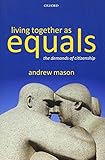Living together as equals : the demands of citizenship / Andrew Mason.
Publication details: Oxford : Oxford University Press, 2012.Description: vii, 229 p. ; 24 cmISBN:- 9780199606245 (hbk.)
- 0199606242 (hbk.)
| Item type | Current library | Home library | Collection | Call number | Materials specified | Copy number | Status | Date due | Barcode | |
|---|---|---|---|---|---|---|---|---|---|---|
| AM | PERPUSTAKAAN TUN SERI LANANG | PERPUSTAKAAN TUN SERI LANANG KOLEKSI AM-P. TUN SERI LANANG (ARAS 5) | - | JF801.M379 (Browse shelf(Opens below)) | 1 | Available | 00002106520 |
Browsing PERPUSTAKAAN TUN SERI LANANG shelves, Shelving location: KOLEKSI AM-P. TUN SERI LANANG (ARAS 5) Close shelf browser (Hides shelf browser)

|

|

|

|

|
No cover image available | No cover image available | ||
| JF801.I84 Citizenship and identity / | JF801.J636 Citizenship and immigration / | JF801.L359 The anthropology of citizenship : a reader / | JF801.M379 Living together as equals : the demands of citizenship / | JF801.P347 Participatory citizenship : identity, exclusion, inclusion / | JF801.P53154 Pengantar ilmu politik / | JF801.P53154 Pengantar ilmu politik / |
Includes bibliographical references and index.
Pt. 1. The normative foundations of citizenship. Conceptions of citizenship -- Justice and equal membership accounts : competing or complementary?. -- pt. 2. The practice of citizenship : is there. A duty to avoid state dependency? -- A duty to share domestic burdens? -- A duty not to seek or gain unfair advantages? -- A duty to offer only public reasons? -- A duty to integrate? -- A duty to act as a global or ecological citizen?.
'Traditional understandings of citizenship are facing a number of challenges. Ideas of cosmopolitan and environmental citizenship have emerged in the light of concerns about global inequality and climate change, whilst new models of multicultural citizenship have been developed in response to the dilemmas posed by immigration and the presence of national minorities. At the same time, more particular debates take place about the demands citizenship places upon us in our everyday lives. Do we have a duty as citizens to take steps to reduce the risk of needing to rely upon state benefits, including health care? Does good citizenship require that we send our children to the local school even when it performs poorly? Does a parent fail in his duty as a citizen - not just as a father, say - when he is less involved in the raising of his children than their mother? Should citizens refrain from appealing to religious reasons in public debate? Do immigrants have a duty to integrate? Do we have duties of citizenship to minimise the size of our ecological footprints? This book develops a normative theory of citizenship that brings together issues such as these under a common framework rather than treating them in isolation in the way that often happens. It distinguishes two different ways of thinking about citizenship both of which shed some light on the demands that is makes upon us: according to the first approach, the demands of citizenship are grounded exclusively in considerations of justice, whereas according to the second, they are grounded in the good that is realised by a political community the members of which treat each other as equals not only in the political process but in civil society and beyond.'--Publisher's website.
There are no comments on this title.

